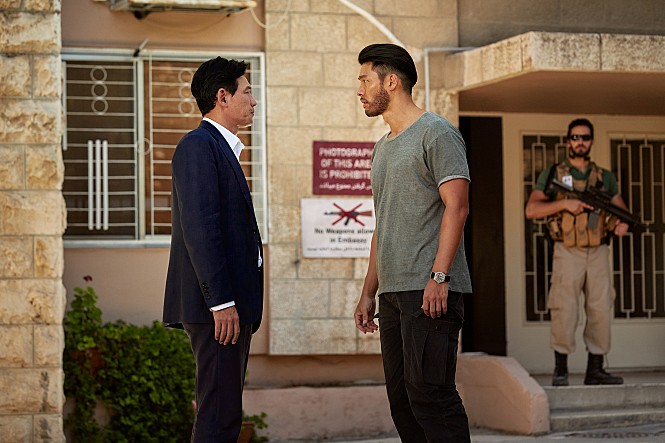It was hard for me to care that much about what was going on in South Korean film “The Point Men”, which is incidentally inspired by the true events of the 2007 South Korean hostage crisis in Afghanistan. Sure, I and many other South Korean people would be much more horrified if all those South Korean Christian missionaries were killed in the end, but I remember too well how insensitive and thoughtless these misguided people were from the very beginning. After all, what is the point of going to Afghanistan if your main purpose is dying as a martyr for your god and then going to the heaven? Isn’t it exactly the same thing which drives those extreme religious fanatics around the world?
And, I tell you now, these people were truly willful and senseless in many aspects. Although the South Korean government did not allow any civilian to go to Afghanistan after the 9/11 incident, they managed to find a loophole and then go there without any preparation at all, and they did not even listen to any advice or warning from the start when they arrived there. For example, it was quite dangerous for them to travel together on a big bus, but they insisted that they should travel together, and they surely drew lots of attention due to their blatant missionary activities with no understanding or respect on those local people and their culture. Furthermore, even after they were eventually saved, they and their church did not show any substantial appreciation to the South Korean government, and this impertinent attitude certainly made a very bad impression on me and others in South Korea.
Anyway, the movie is mainly about two fictional characters assigned to the negotiation for saving these hostages: Jung Jae-ho (Hwang Jung-min) and Park Dae-sik (Hyun Bin). Once the news about the hostages came to the South Korean government, Jae-ho and his fellow diplomats are quickly sent to Afghanistan, but things have already been quite complicated for them. While they surely want to rescue the hostages as soon as possible, Jae-ho and his colleagues are soon sandwiched by the local government figures and the Taliban soldiers holding the hostages, both of whom are not so willing to step back a bit more for the ongoing negotiation.
That is why Dae-sik, a weary but handsome National Intelligence Service (NIS) agent comes into the picture as a hostage negotiation expert. While still haunted by one big devastating failure in Iraq, Dae-sik is ready to do as much as possible for the hostages despite his initial reluctance, but he only comes to clash a lot with Jae-ho due to their different viewpoints on the situation. Dae-sik believes that they must be prepared to do anything for saving the hostages, but Jae-ho is also concerned about the public image of their government even though he does care about saving the hostages. After all, negotiating with those Taliban soldiers will make the South Korean government look rather bad, and following their demand is nearly impossible to say the least.
Anyway, the situation becomes a bit better when Dae-sik comes with a possible solution for that. As assisted by a Korean con man who turns out to be useful as a translator, Dae-sik and Jae-ho approach to someone who may influence the ongoing hostage negotiation to some degree, and the mood becomes a little relaxed as they are invited to a local tribe party later as a part of their urgent mission.
Of course, things do not go that well for them later, and both Dae-sik and Jae-ho become all the more desperate just like several South Korean officials around them. As the clock keeps ticking, it is apparent to both of them that they need to do something quite risky to say the least, and the story eventually culminates to the narrative point where they confront those Taliban soldiers for themselves.
It goes without saying that the movie is an exaggerated and simplified fictional version of whatever happened during that urgent time, but it is still difficult to care because it is bland and superficial in terms of story and characters. While both of its two lead characters are flat archetypes without much human quality to engage us, many of supporting characters around them are more or less than plot elements or the mere parts of the background, and I also do not like the apparent whitewashing of the hostages, who are presented as almost blameless victims in the film.
The main cast members of the film do as much as they can do with their cardboard characters, though they are often limited by their respective roles. Despite looking intense and desperate as required, Hwang Jung-min seems to be stuck on autopilot as he has often been during last several years, and I only remember how frequently he raises his voice throughout the film. On the opposite, Hyun Bin tries to bring some gravitas to his taciturn character, but he only comes to look uninteresting on the whole, and Kang Ki-young, who plays the aforementioned interpreter, is unfortunately demanded to function as a rather distracting comic relief in the story.
“The Point Men” is directed by Yim Soon-rye, who previously made “Little Forest” (2018). Compared to that gentle film, “The Point Men” looks and feels quite different in many aspects, and I guess Yim wants to demonstrate here that she can also make a thriller film, but the result is rather tepid with a number of flaws which annoyed me a lot during my viewing. Let’s hope that she will soon move onto better things to come.










